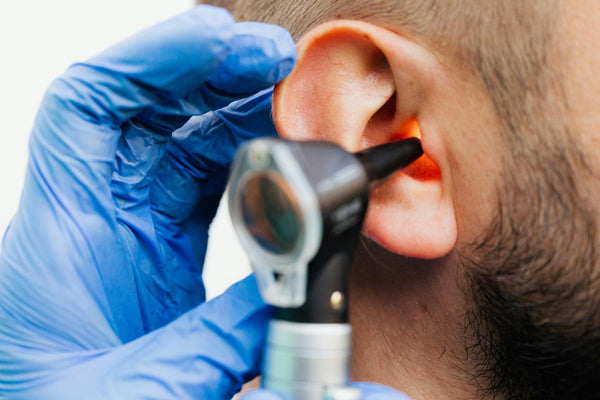
If you’ve noticed discharge coming from your ear, you’re not alone. It’s a common symptom that can have several causes, ranging from a simple ear infection to a small perforation in the eardrum. While it can look worrying, ear discharge (sometimes called otorrhea) is often treatable and rarely serious when addressed early.
At Leightons, our audiologists are here to help you understand what’s happening and support you with expert ear care and hearing advice.
What is ear discharge?
Ear discharge refers to any fluid, wax, or pus that comes out of your ear canal. A small amount of clear or yellow wax is perfectly normal, as it helps protect your ear from dust and bacteria. However, if the discharge is watery, thick, or has an unpleasant smell, it could signal an infection or other ear condition that needs attention.
Common causes of ear discharge
There are a few different reasons you might experience ear discharge:
- Ear infection (otitis media or externa): Infections can cause fluid or pus to build up and leak from the ear.
- Perforated eardrum: A small tear in the eardrum may result in clear or slightly bloody discharge.
- Swimmer’s ear: Prolonged moisture in the ear canal can lead to irritation and infection.
- Foreign objects or injury: Inserting cotton buds or hearing aids incorrectly can cause trauma and discharge.
- Skin conditions: Eczema or dermatitis around the ear can lead to flaky, weeping skin and mild discharge.
Signs and symptoms to look out for
Ear discharge is sometimes accompanied by other symptoms, such as:
- Ear pain or discomfort
- A feeling of fullness or blockage
- Temporary hearing loss
- Itching or irritation in the ear canal
- Fever or dizziness (in more serious cases)
If you notice thick, coloured, or smelly discharge that lasts longer than a few days, it’s best to get your ear checked by a professional.
When should you see a professional?
You should always seek professional advice if:
- The discharge is persistent or getting worse
- You experience pain, hearing loss, or dizziness
- The fluid is bloody or has a foul odour
- You’ve recently had an ear infection or injury
Leightons’ audiologists can carry out a safe and thorough ear health check to identify the cause and recommend the right next steps.
Diagnosis and treatment options
Depending on the cause, treatment for ear discharge may include:
- Antibiotic drops or medication for bacterial infections
- Ear cleaning or microsuction to safely remove wax or fluid
- Avoiding water exposure while your ear heals
- Referral to your GP or ENT specialist for more complex cases
At Leightons, we’ll ensure your ears are properly examined and treated in a clean, safe, and professional setting.
Can ear discharge affect hearing?
Temporary hearing loss is quite common during ear infections or when the ear canal is blocked with fluid or wax. Once the underlying issue is treated, your hearing usually returns to normal. If you’re unsure whether the discharge has affected your hearing, a free hearing test can provide reassurance and help track your recovery.
Preventing ear discharge
You can reduce the risk of ear discharge with a few simple steps:
- Avoid inserting objects (like cotton buds) into your ears
- Dry your ears gently after swimming or showering
- Manage allergies or skin conditions that affect your ears
- Schedule regular ear health checks if you’re prone to ear infections
Book a free hearing assessment
If you’ve noticed ear discharge or any changes in your hearing, don’t wait for it to clear up on its own. Our expert audiologists can assess your ear health, remove any build-up safely, and guide you on the best treatment options.
Book your free hearing assessment and take the first step towards clearer, more comfortable hearing.








